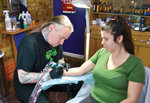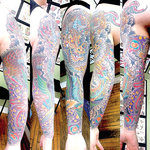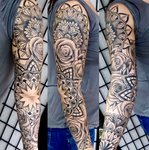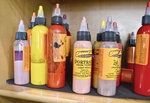




In 2020, just about anything in the realm of tattooing has found a home in Lansing.
Are you looking for simple flash art that will have you in and out in just a few hours? Photorealistic portraits? Traditional style art of something righteously wicked, like a cracked skull or a medieval dagger? Or maybe you just want something nice and sweet — a quote from your favorite Disney movie in whirly, wine-mom Target art cursive. Lansing runs the full gamut from sleaze to class and back again. Even if you’re already tatted and suffering from buyer’s remorse, there are places to have your regret lasered into oblivion.
But who’s behind some of Lansing’s most popular and interesting shops, and how can we explain the mainstream breakthrough of tattoos? Veteran tattooists, apprentices and an MSU professor helped paint the big picture, poke by poke.
Epidermis canvas
Sean Peters, 45, tattoo artist and owner of Eclectic Art Tattoo Gallery, has been in the game since age 15, opting to drop out of Eastern High School to pursue tattooing full time. Putting all of his chips into tattoos was a gambit that has, so far, paid off handsomely.
“It was a new reality,” Peters said. Suddenly, he had to tackle several wildly varied subjects in one day, from Tweety Bird to a photorealistic wolf. “I was used to making art on the side for bands,” he said. “I quickly learned my vocabulary wasn’t as vast as I thought. There’s a whole set of rules that don’t apply to any other medium.”
A group of Peters’ fellow Lansing beer drinkers and hell raisers introduced him to Dennis Baker, the original owner of Splash of Color. Baker told Peters he was interested in hiring a younger apprentice. Peters came by the shop with some work created while he was still in high school. Baker was immediately impressed. Peters took on an apprenticeship that morphed into a 30-year career.
Baker eventually became burnt out with running the shop. Peters became co-owner with Kris Lachance and helped oversee a period that saw Splash flourish into one of Lansing’s most popular tattoo shops. Like many ambitious tattooists who walked through the halls of Splash, Peters splintered off, opening Eclectic in 2010 with Mike Riina — though Riina would go on to open his own shop, Lionfish Tattoo.
Peters’ apprentice Harley Zeke, 28, is a self-taught artist, unless you count his attendance at the artsy Vivian Riddle Magnet School. While the apprenticeship at Eclectic allows him to pursue several creative interests, Zeke is focused on widening his scope in preparation to provide clients with any popular tattoo style they can throw at him. But translating one’s skills with pencil and charcoal to the intimidating tattoo machine isn’t easy. The machine was the hardest art tool Zeke ever worked with.
“None of it applies remotely to any surface the way needles apply to skin,” Zeke said. “There is so much to consider, between the machine’s speed and hand movement speed. It’s so important, and it’s not prevalent in any of the art forms that I do normally.”
Greg Drake, 49, a tattooist for 25 years, is a fellow graduate of the Baker/Splash of Color apprenticeship — an experience he lovingly likened to being a member of the Addams Family. Like Peters and Riina, he runs his own shop, Local Tattoo & Laser Co., which he opened in 2010 with his wife, Monica Drake, 44. He recalls coming up at a time when tattoos would primarily be seen within fringe subcultures — the bikers, the rockers and the fellow tattoo artists. The so-called scene of shops was “non-existent.”
“The industry wasn’t as popular, there weren’t appointments,” Drake said. “You sat there and waited for people to come in. You were pretty lucky if you had tattoos to do.”
Drake said the mid-90s saw different, more “acceptable” types of celebrities prominently showing off tattoos, allowing the industry to begin chipping away at its taboo reputation.
“There were more artists, skateboarders and snowboarders instead of bikers and factory workers,” Drake said. “It became more art-influenced, rather than just existing as an underground art form.” Artists began sharing more information and tattoo conventions got big. “That was like college for a young tattoo artist,” Drake said.
Drake has done a lot of work on Chris Fox, 36, owner of Fish Ladder Tattoo Co.
“He’s kind of the guy that got me into tattooing,” Fox said. “I was getting tattooed a lot by him when he was still working in Grand Rapids. He hooked me up with the guy that apprenticed me.”
Fish Ladder, founded by Eric Jenks and Chris Boilore, perennially receives high marks. It has won City Pulse’s Top of the Town contest several times. Fox began tattooing there in 2009 after his deathcore band See You Next Tuesday went on indefinite hiatus. “I was extremely lucky when I was asked to join. At the time, Chris’ work was highly influential to me.”
Fox eventually found himself in a position to take over as owner, a gig he was grateful to accept. “Chris and Eric built this place from the ground up. I have a lot of travel experience, and I was able to use my connections to bring in guest artists,” Fox said. “Fish Ladder used to be a Lansing thing. Now it seems to be more of a Michigan thing.”
Body style
Lauren Robison was inspired to tattoo in her teenage years after growing up watching popular shows like “Miami Ink” on television. Though Robison, 28, has only been tattooing in Lansing for two years, the scene has been overwhelmingly welcoming. She moved to Lansing from Ft. Wayne to tattoo full time after meeting Mike Riina, now owner of Lionfish Tattoo, at one of Robison’s guest spots with an Indiana tattoo shop. Starting at Eclectic when Riina was still co-owner there, Robison joined him when he left to open Lionfish.
“There used to be old school traditions, where if you shared information, that would be considered wrong,” Robison said. “Things are changing as the years are progressing. Everyone is friendly and wants to help everyone out.”
Robison said women tattoo clients often feel more comfortable working with a woman artist.
“I’ve been really lucky. My past has helped me get to the point where I don’t worry about too many stigmas of being a female tattoo artist,” Robison said. “Being a woman helps bring in female clientele — they feel comfortable and get a more feminine touch to their tattoo.”
Therèsa M. Winge, an associate professor of fashion design and theory, is an expert in the vast and dense culture of tattoos. Her book “Body Style,” traces the social and cultural currents that underlie the art of tattoos, beyond the mere fact that they look cool.
“Facial tattoos used to belong to early Japanese culture and early indigenous North America,” Winge said. “They would tattoo marks that were identifiable to their family. Now, our facial tattoos don’t necessarily represent heritage, but they still construct identity.”
The widespread idea that tattoos have gone mainstream might be bouncing around in an echo chamber, as Winge isn’t quite on board.
“I haven’t found that tattoos or body modifications are actually acceptable to the degree that people under 30 think they are,” Winge. “But that kind of gives me hope. I find people use tattoos and body modifications to communicate and construct identity, and even get through difficult things in their life.”
It often happens that a young person gets a prominent tattoo only to have their beautiful feeling of self-expression squashed by the conformist uniformity of the working world. “I am not confident everyone is accepting yet, but there was a tattoo renaissance in the ’70s and ’80s,” Winge allowed.
That’s when tattoos broke out of their stereotypical association with soldiers, sailors and prison inmates. As younger people got inked, that hardened image began to dilute and become less intimidating to suburbanites.
Winge likened the trendiness of tattoos to fashion trends. Today’s youth culture is highly susceptible to “influencers” on Instagram and YouTube, or copy the tattoo tastes of their favorite rappers. Post Malone, with face tattoos galore, might inspire many young people to take a dip in the world of facial tattooing.
Winge isn’t sure if that’s a “good thing.”
“There might be some poor decisions that people are making,” Winge said.
But no matter how popular the extreme tattoos get, few shops will provide a face, neck or hand tattoo to somebody who isn’t already seriously inked. Even then, if you’re a failing SoundCloud rapper with a face tattoo, you can always visit a laser artist like Monica Drake, who’s had success removing even the most obscene and poorly done tattoos.
No going back
Some artists in Lansing use the tattoo industry as a gateway to other causes. Corey Warren, 30, co-owner of Ink Therapy, has a dual purpose for his tattoo and piercing shop. Warren opened Ink Therapy with his mother, Jacque Liebner, in 2016, and he runs a connected nonprofit organization, WAI-IAM, which works with several drug courts and post treatment centers, such as the RISE Recovery Community sober living house.
“I don’t know exactly why, but for so long there’s been a stigma where somehow drugs and tattoos are meshed together. That’s not the case,” Warren. “Ink Therapy was born out of the idea for a clean and sober shop where clients knew they were in good hands.”
Warren has spent his entire life intrigued by tattoos, getting his first at age 17, a shark cruising across his back. Taking the symbolic route that many people do when getting a tattoo, Warren’s shark represents an instinctual desire and motivation for constant forward movement, as the curvature of a shark’s pectoral fins limits its ability to move backward.
“People can take their journeys and stories, whatever they’ve gone through in life, and display it on their body and be proud of it,” Warren said. “And I have tattoos on my body that remind me of things I don’t want to go back to. There’s so much significance to them — tattoos have always inspired me.”
But no matter what your endgame is, there’s likely a corner of the Lansing tattoo scene for you.
“We definitely have higher prices in Lansing, but compared to other major cities where we’re doing the same caliber of work, we’re pretty affordable,” Fox said. “Lansing is a little city that has a lot to offer.”
Eclectic Art Tattoo Gallery
615 E. Michigan Ave., Lansing
eclecticarttattoo.com, (517) 485-7872
Expressions Body Art Studio
4617 N. Grand River Ave.Lansing
facebook.com/E.B.A.S.TATTOOS, (517) 993-5198
Fish Ladder Tattoo Co.
302 E. Grand River Ave., Lansing
facebook.com/FishLadderTattoo, (517) 507-0353
The Gallery Fine Art & Tattoo Studio
2515 E. Jolly Road #2, Lansing
Facebook: Gallery Fine Art & Tattoo Studio, (517) 853-8278
Ink & Needle
One location in East Lansing, two in Lansing
Ink Therapy
2819 E. Saginaw St., Lansing
facebook.com/InkTherapyLansing, (517) 614-6711
Lionfish Tattoo
3233 W. Saginaw St. Suite C, Lansing
Liquid Tattoo
16583 Old US 127, Lansing
Facebook: Liquid Tattoo Lansing, (517) 346-7702
Local Tattoo & Laser Co.
2020 E. Michigan Ave, Lansing
localtattoo517.com, (517) 708-7338
Lucky’s Tattoos
1219 E. Cesar Chavez Ave.
(517) 894-4710
Master Tattoo and Piercing
600 E. Cavanaugh Road, Lansing
Facebook: Master Tattoo and Piercing, (517) 377-5946
Ministry Ink Tattoo
610 N. Creyts Road, Lansing
ministryinktattoo.com, (517) 253-8746
Splash of Color
515 E. Grand River Ave., East Lansing
ministryinktattoo.com, (517) 333-0990
Vivid Ink
2375 N. Cedar St. #C, Holt
vividinksingers.com, (517) 694-0833
1 comment on this item Please log in to comment by clicking here
Support City Pulse - Donate Today!
Other items that may interest you

kayslug
I wish they would impress people with how hard it is to remove a tattoo. It takes time and money and it hurts. Why not offer henna tattoos - that will eventually wash off. That might expand their business and also give people an experience of having a tattoo and give them a chance to reconsider getting a permanent tattoo.
Saturday, February 22, 2020 Report this